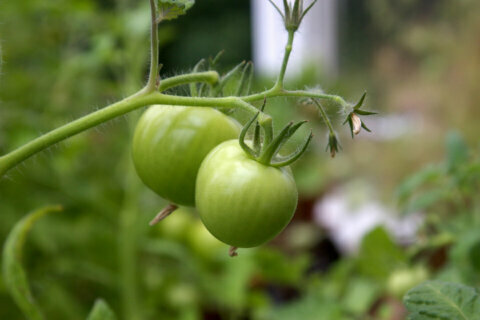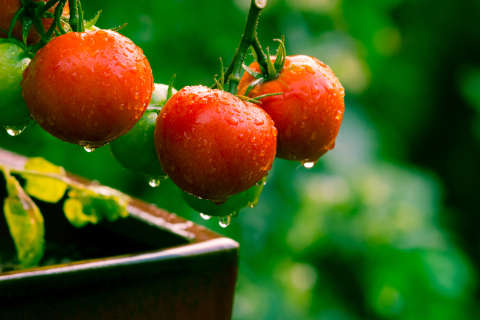Meet Mike on Saturday and Sunday, April 16 and 17, at The Calvert (County) Home Show in Prince Frederick, Maryland. Details here.
Rubber mulch not a deterrent to termites
In last week’s bits, we passed on a warning from Terminex that running mulch right up against the side of your home is a prime invitation for termites. This led online reader “GF Jacket” to say the “best way to keep termites away while mulching close to your house is to use rubber mulch.”
Well, that’s an understandable but completely incorrect assumption, GF. It isn’t the wood in most modern mulches that draws termites to your home; it’s the protective layer of underground moisture created by any kind of mulch — wood, rubber, even stone.
One of the simplest and best ways to protect your home against termite infestation is to have an area of bare ground — at least 4 inches and preferably 12 — around your foundation. Any kind of mulch touching your home invites termites to feast on your framing. Any kind of mulch.
Mosquito control 101
Arlene in Silver Spring writes: “Mosquito time is coming and we want to be able to enjoy our yard this year — which is often impossible after May. Will you be doing any segments on this problem again soon?”
We already did, Arlene — a month ago, when the Zika virus was making huge news. The whole week of bits dated Feb. 26 is devoted to not getting bitten, including how to make cool BTI traps that will foil egg-laying females.
Right now, you should be cleaning up outdoor trash such as bottle caps and plastic bags; emptying standing water from wheelbarrows, buckets, plant saucers, recycling bins and the like, and making sure your gutters are clear of water and debris. They’re a huge unseen source of mosquito breeding.
Herbal sprays make effective outdoor mosquito barriers
Arlene continues: “I believe you have recommended garlic spray in the past as an outdoor mosquito repellent. A mosquito abatement company based in Montgomery County is offering what they say is an all-natural mosquito barrier spray made with rosemary, geraniol and peppermint …”
Sounds like a nice mix, Arlene. Essential oils of rosemary and peppermint are shown to be effective mosquito repellents. And geraniol is an essential oil distilled from certain geraniums, roses and the well-known mosquito-repelling plant citronella (specifically from the fragrant root of the giant tropical grass of that name).
Regular sprays of such a mixture — or good ol’ garlic oil — should help keep mosquitoes from using your yard as their personal blood bank. You’ll find garlic oil sold as a barrier spray under several brand names; the originals are “Garlic Barrier” and “Mosquito Barrier.”
Can I grow a kumquat?
Lou in Rockville writes: “I recently read an article about how good kumquats are, and was wondering if I could raise them in the vicinity of Rehoboth in Delaware. I’m sure I could do it in a large pot, but was wondering how well they might do in the ground in a sheltered yard?”
Kumquats are totally tropical plants, Lou, and would die with the first frost in Rehoboth or Rockville. But like many other types of small citrus, the tasty little treats can be grown in a pot that goes outside in summer and back indoors for the winter.
My friend Lee Reich, author of the book Grow Fruit Naturally, personally pots kumquats in upstate New York. He says that the leaves of the plants are an attractive glossy green, the flowers are heavily scented, and the orange-colored fruits are unique in that you eat them skin and all. In fact, Lee says, the inner part of the fruit is tart, but the skin is sweet.
A frosty start to April
Have you been enjoying the ridiculously warm weather the last few days and weeks? Well, get ready to be reminded of why April is called “the cruelest month.” Most of our region is about to fall prey to frosts and freezes over the next few nights.
If you have houseplants or overly optimistic starts of peppers, tomatoes or other summer crops outdoors, bring them in now — before they get the big chill.
Don’t worry about spring bulbs or cool-weather crops such as peas and salad greens; they can handle a couple of cold nights.
Try to protect fruit trees such as peaches and apples that are currently in full bloom, especially if you live in one of the areas predicted to drop below 30 degrees over the next few evenings.
Water the soil well (fruiting trees can better resist cold stress if they’re well-watered); drape the canopies with floating row cover (the biggest brand name is Reemay); or hang old-fashioned incandescent Christmas lights in the trees, and leave them on overnight to help the flowers resist freezing.







